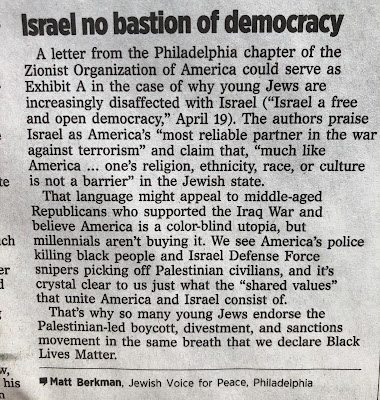David Collier: The BBC apology should be absolutely rejected
The reason the apology should be rejected is simple. The BBC apology is a tick box exercise for the BBC – who have no choice but to apologise on this particular issue. Why? Because we caught the BBC red-handed and forced them into a corner.Israeli embassy original target in Taylor Swift terror plot
What did the BBC actually admit to? The discriminatory treatment is being explained away by the BBC as a slight misstep that is easily corrected. As if one person (in this case probably presenter Ben Brown), made a small mistake in focus. In the apology the BBC stated the interview should have been ‘less about politics and a little more about Chanukah’. That is nonsense and does not address the key issues at all. The real question here is WHY the interview with the Rabbi was approached so differently from the interviews of the Imam and Reverend?
It is important to remember just how blatant the discrimination was. The interviews with the Imam and the Reverend were both headed by sympathetic videos. The Rabbi had none. The images that accompanied the first two interviews were respectful and religious – the Rabbi got images of tanks. This is without even referencing the aggressive line of questioning or the 2:1 nature of the whole setup – with two Palestinians being given airtime, against just one Israeli.
Which means this was not just about the presenter or questions raised during the interview. The BBC’s anti-Jewish discrimination was a team effort. Ben Brown (the anchor) wasn’t the producer of the program. He also had nothing to do with the first interview. It would be a big mistake just to point the finger at Ben Brown (and an equally big mistake to whitewash him).
What about those responsible for putting together the photos. Or the planning producer who probably set up a lot of the questions in advance. What about the programme editor? Who decided that there would be no sympathetic video at the start?
There are several people involved here – and not ONE OF THEM saw a problem. In fact, as the problem became amplified as each piece of the bias added to the next (no sympathetic video, hostile photos, aggressive questions) – it seems that every step of the way the BBC’s anti-Jewish mindset played its part.
They say that ‘it takes a village to raise a child’. It is also true that it takes a pack of antisemites for the BBC to ambush a Rabbi during a live interview. This was a team effort.
In a chilling revelation of threats facing Israeli diplomatic missions, a 19-year-old ISIS supporter considered attacking the Israeli embassy in Vienna before planning to target a Taylor Swift concert, The Washington Post reported on Sunday.One Israeli on respirator, other has serious injuries after New Orleans attack
The case highlights security concerns for Israeli interests in Europe.
Before settling on the concert venue as his target, Beran Aliji, a dual citizen of Austria and North Macedonia, had carefully evaluated other high-profile locations, including the Israeli embassy, Kurdish diplomats and a Shi’ite mosque, according to police records obtained by the newspaper.
The discovery prompted heightened security measures at Israeli diplomatic facilities across Europe, as investigators uncovered evidence of Aliji’s extensive consumption of terrorist propaganda and his pledge of allegiance to the Islamic State.
By July, amid what he described as a mental-health crisis, the Austrian teenager quit his factory apprenticeship and isolated himself in his apartment, becoming obsessed with thoughts of death, he later told police. Without money or prospects, and lacking close friendships, he immersed himself in violent videos and secret chatrooms devoted to the Islamic State.
“These are bitter, angry people,” Bruce Riedel, a counter-terrorism expert and 30-year veteran of the CIA, said. The case reflects a broader pattern of self-radicalization that concerns Israeli and Western security officials.
The investigation revealed hundreds of text messages and multiple police reports showing how Aliji sought guidance from individuals he believed to be Islamic State members. “My operation is to take place at a big concert,” he wrote in one message, according to Austrian records. “I will try to get a gun and bombs. If that doesn’t work, I will use big knives. Or I will kill a police officer and take his rifle.”
Elad Shoshan, the Israeli consul to the southwest United States, told JNS over the weekend that he went to New Orleans after learning that two Israelis had been hurt in the car ramming attack, which the FBI is investigating as a terror attack, in the early hours of New Year’s Day.
He did so “to be with the injured, assist their families, connect with the authorities and local Jewish community, communicating with the medical team and preparing accommodations for the arrival of the parents to New Orleans,” Shoshan told JNS.
“The Consulate General of Israel to the Southwest wishes to extend its heartfelt condolences to the families affected and offer prayers for the swift recovery of those injured,” he added.
Both of the Israelis, whose families requested that their names not be released, are in their mid-20s and are receiving medical care, Shoshan told JNS.
“They were visiting the United States as tourists, looking forward to ringing in the New Year in New Orleans,” he said. “It is tragic that these young men, who came to experience the joy of this vibrant city, have become victims of this shocking act of terror.”
“What should have been a special celebration has turned into an unimaginable tragedy for them and their families,” he added.
One of the young men is on a respirator “due to severe head trauma and internal injuries,” according to Shoshan. “The second Israeli is stable and communicative but is also recovering from serious limb injuries.”
Relatives of both arrived in New Orleans late on Friday night “to be with them during this difficult time,” Shoshan said.






 Buy
Buy 










.jpg)





















.jpg)





